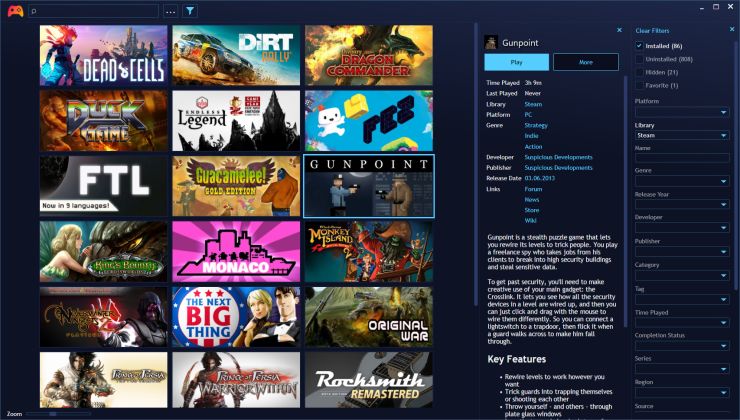This could be very interesting and exciting. Canonical has confirmed they're working towards an immutable version of Ubuntu for desktop users based on all the work they've done with Ubuntu Core.
Mentioned initially in a comment on OMGUbuntu with a target for the next LTS (long term support) release, later a full blog post was put up on the official Ubuntu website going into more detail on their thoughts and plans. Don't worry though, the normal Ubuntu releases aren't going anywhere.
For those who don't follow what an immutable OS even is: in simple terms it keeps the main operating system as read-only, which is supposed to make it more stable, secure and easier to update with all your applications isolated from it with some sort of container system. So think like SteamOS on Steam Deck, Fedora Silverblue or Ubuntu Core and even Google's Chrome OS.
From the blog post:
Behind the scenes, the Canonical team has been actively exploring the benefits of Ubuntu Core beyond the realm of IoT, most notably in the context of developers and daily users.
The properties inherent to Ubuntu Core such as secure boot, recovery states and hardware backed encryption would bring significant improvements to the security posture of a user’s PC.
It also introduces the concept of modularity to the user experience, where users may experiment with alternative desktop environment snaps while remaining on a highly stable, signed and secure LTS base.
The use of snap channels also brings into the play the concept of ‘rolling’ certain elements of the distribution. Gamers, for example, might opt-in to a kernel channel that ships the latest NVIDIA drivers as soon as they are available, in the same way the Ubuntu Desktop team did for Mesa as part of our work on the Steam snap.
However, this level of stability and security comes with trade-offs for developers and tinkerers, restricting modification of the base OS in favour of a ‘just works’ experience. For developers who see their device as a platform for open source development, the solution is container-based environments similar to the LXD based Crostini. For tinkerers, the classic Ubuntu images would remain their preferred route to enable full control of (and responsibility for) their system.
While Ubuntu Core is meant for IoT OS for embedded devices, this is something different to give desktop users a potential taste of things to come. With the rise of more applications coming to the likes of Snap and Flatpak, this does make some sense and I think Jorge Castro's blog on how Linux distributions are changing is also a good read for what's to come.
Canonical has been expanding Snaps now for a while with the likes of the stable Steam snap for Ubuntu 23.04, the upcoming CUPS Snap and naturally plenty more to come.
How do you feel about an immutable version of Ubuntu with lots of Snap packages?
Even without immutability, most big distros are already "it just works" - and in addition also offer more possibility to customize.
What it would offer is more security to not accidentally mess up your system, I'd wager.
But even then, that's what rollbacks are for, so... yeah, I'm really not sure about the use case on normal desktop.
I'm not too much of a fan of Snap, which is why the Fedora immutable desktops are a bit more interesting to me. But that has an asterisk as well: I don't like RPM.
I've said it before and I'll say it again: I think the immutable desktops are best for the professional environment where you have a team creating and maintaining custom builds. I don't think it's going to take a hold on the home user. I say that, but my confidence is not rock solid. I'm curious enough to play with it in a VM and see how it develops. I can confidently say that I'm not interested in using it personally with my experience thus far.
EDIT: Just to add a little positive spin, I'll add that I'd be happy for immutable desktops to be successful, especially if they drove Linux adoption.
Last edited by 14 on 5 Jun 2023 at 1:21 pm UTC
I know this is a strongly divisive topic, and people love to hate Snap... but for a good reason : I've been hating it ever since some handy Firefox extensions stopped working (VideoDownloadHelper), or it somehow couldn't open HTML files located in /usr/local (quite a bummer to install Chromium just for reading offline documentations I mean... why ?!)
So long live apt, Deb packages, and PPAs ;D (Oh, and AppImages).
I do think it's neat that Canonical is going to make an immutable version of Ubuntu...but I'm not interested, because I don't like Snap. I prefer Flatpak.
For desktops, I'm not sure about the use case.
Even without immutability, most big distros are already "it just works" - and in addition also offer more possibility to customize.
What it would offer is more security to not accidentally mess up your system, I'd wager.
But even then, that's what rollbacks are for, so... yeah, I'm really not sure about the use case on normal desktop.
The normal use case for immutability on the desktop, is the same reason immutability is the default on smartphones. I truly believe that the average human sees technology (in all forms) akin to that of an appliance or automobile. You push a button, engage with the controls, and it generates the expected response near every time. After providing voluntarily community IT support for many years, this impression is almost carved in stone within me.
At the core of it, the people I work with want to know very little about their PC (for a variety of reasons). Majority never even change the desktop wallpaper. They push the power button, then expect everything to work and be up to date. The younger ones do some customization, but defaults are king. Their systems take care of themselves and manual interaction is only performed when forced by system prompts. Linux can not enter this space without providing that which the current offerings have, which is an appliance-like nature by default. Automatic stable atomic updates, simple program installation, access to the majority of modern applications, and quick recoverability from technological hiccups are all needed to be baked in the operating system. Due to the functional structure of Linux and its FOSS subsystems, I truly respect the struggle that Fedora Silverblue/Kinoite, SteamOS, MicroOS Aeon, and now Ubuntu development teams are engaged in to make this experience come to light.
Those reading here on GamingOnLinux are near guaranteed to not be the category of people I have described above. Hopefully, the Linux community at large can grow to be more understanding of the need for immutable desktop operating system. Without a doubt, there is a commercial interest from the these Linux companies, but should we not be supportive all the same for getting FOSS into the hands of people who are currently being exploited by non-open systems? Give this time, let's not let snaps vs ostree vs native be the focus, these things sort themselves out. While Fedora Kinoite may be my current go-to recommendation for new Linux users, I am very curiosity to see how things play out on the snap front.
TL:DR Immutable OSes need to come for the masses to engage with Linux and FOSS at a system level. Average people have quite a different perspective on computers than tech-understanding users like the GamingOnLinux readership. On both the commercial and humanitarian fronts, Immutable OSes provide benefits and the established Linux community should do it best to support these efforts (or at the very least not publicly disparage the good that comes form it).
Edit: To clarify, my last sentence was not implying that your specific comment was disparaging. Rather it was direct to the generic Linux user/commentator that might be inflamed by immutables.
Last edited by Numeric on 5 Jun 2023 at 2:43 pm UTC
We are going to have immutable OS partition with every program being in a kind of container, be it snap, appimage, flatpak and so forth., installed via some app store à la android. But there will still be distro with package manager and maintainers. Both have their use case. I know that I really loved package manager when I started using Linux and that's one of my favorite things of the Linux environment but I also respect other views not everyone wants to care about dependencies.
Sounds similar to Fedora [Silverblue](https://fedoraproject.org/silverblue/).
The concept is similar, but the implementation is different. Silverblue depends on ostree to implement atomic updates while still depending on RPM. Ubuntu Core does it differently: it breaks down the system into smaller components and packages each of these components as a snap, so there are no DEB packages any more. This has some advantages over the Silverblue approach because you can control these components individually. For example, you can opt to switch your kernel to the "edge" channel and you'll get the latest kernel without having to build it yourself and without losing automatic updates to that kernel. Same can be done with Gnome Shell or Mesa or any other component in the system. You can also easily install multiple desktop envs without messing the system since each of these DEs will be a separate snap, which likely means there won't be different flavours of this, just one flavour with all DEs.
This also means Ubuntu can, hopefully, provide a better install and update experience since it'll have one package system instead of two, so the devs can focus their efforts on getting this right instead of having to maintain two separate package formats.
All of this, however, is theoretical potential. It remains to be seen whether Canonical manages to get it right, but if they do I bet it'll make Ubuntu an attractive distro to a lot more people.
Personally, I hope this will encourage someone to fork snap and make it properly open.
So, an entry level Linux drug, then?For desktops, I'm not sure about the use case.
Even without immutability, most big distros are already "it just works" - and in addition also offer more possibility to customize.
What it would offer is more security to not accidentally mess up your system, I'd wager.
But even then, that's what rollbacks are for, so... yeah, I'm really not sure about the use case on normal desktop.
The normal use case for immutability on the desktop, is the same reason immutability is the default on smartphones. I truly believe that the average human sees technology (in all forms) akin to that of an appliance or automobile. You push a button, engage with the controls, and it generates the expected response near every time. After providing voluntarily community IT support for many years, this impression is almost carved in stone within me.
At the core of it, the people I work with want to know very little about their PC (for a variety of reasons). Majority never even change the desktop wallpaper. They push the power button, then expect everything to work and be up to date. The younger ones do some customization, but defaults are king. Their systems take care of themselves and manual interaction is only performed when forced by system prompts. Linux can not enter this space without providing that which the current offerings have, which is an appliance-like nature by default. Automatic stable atomic updates, simple program installation, access to the majority of modern applications, and quick recoverability from technological hiccups are all needed to be baked in the operating system. Due to the functional structure of Linux and its FOSS subsystems, I truly respect the struggle that Fedora Silverblue/Kinoite, SteamOS, MicroOS Aeon, and now Ubuntu development teams are engaged in to make this experience come to light.
Those reading here on GamingOnLinux are near guaranteed to not be the category of people I have described above. Hopefully, the Linux community at large can grow to be more understanding of the need for immutable desktop operating system. Without a doubt, there is a commercial interest from the these Linux companies, but should we not be supportive all the same for getting FOSS into the hands of people who are currently being exploited by non-open systems? Give this time, let's not let snaps vs ostree vs native be the focus, these things sort themselves out. While Fedora Kinoite may be my current go-to recommendation for new Linux users, I am very curiosity to see how things play out on the snap front.
TL:DR Immutable OSes need to come for the masses to engage with Linux and FOSS at a system level. Average people have quite a different perspective on computers than tech-understanding users like the GamingOnLinux readership. On both the commercial and humanitarian fronts, Immutable OSes provide benefits and the established Linux community should do it best to support these efforts (or at the very least not publicly disparage the good that comes form it).
Edit: To clarify, my last sentence was not implying that your specific comment was disparaging. Rather it was direct to the generic Linux user/commentator that might be inflamed by immutables.
I can get on board with that
I raged yesterday by using a fresh install of a debian/ubuntu on my scientific computing unit to discover that they blocked pip for python out of virtual env...
I only use this computer to do massive parallel computing, copying pasting from usb key script and running them directly
Snap is a plague, I have to install flat with apt ... it's getting mad, and this created the necessity and advertising for an immutable GNU/unix OS
And Linux can easily prevent the biggest issue with Android and Windows and such, which is "unremovable bloatware" - when your OEM or carrier puts a bunch of garbage on your device that they want you to have but you don't want to. With Linux, there is little point in pushing garbage to users as anyone can just make a distro without the garbage. For example, when Canonical pushes snaps which are complete garbage, I can just download Fedora that does not have snaps. It is unfortunate that it happens but at least I have some choice.
Canoniclowns.
Hmm would You say that to their face in person? Meeting Canonical devs and for example Shuttleworth? It is Ubuntu to thank for fair bit for so much in the world of Linux
100%. What greatness Canonical and *buntu used to represent is no longer true, and I do not care one spit for the current iteration. My opinion of course. Feel free to have a different one.Canoniclowns.
Hmm would You say that to their face in person? Meeting Canonical devs and for example Shuttleworth? It is Ubuntu to thank for fair bit for so much in the world of Linux
So I couldn't care less...
So whatever Canonical decides to do with their base Snap OS is pretty irrelevant for the general linux ecosystem.
Friendly reminder that Snap is not free software due vendor lock-in (its sole package repository is proprietary).
So whatever Canonical decides to do with their base Snap OS is pretty irrelevant for the general linux ecosystem.
Total BS! If that was the truth, you would not be able to download and install Snaps outside of Snap Store, and Rudra (a teenage boy) would not be able to create an alternative store.
I guess I don't understand how an immutable distro is significantly different in terms of security and stability from the current way of doing it with a locked root account. Aren't they basically different paths to the same end?Others can comment on security, but I don't think it offers many security benefits.
Stability-wise, the base packages are offered as an "image", which are core components like GNOME, Linux, GNU utilities, GRUB, GDM, and a horde of libraries. Everything else is offered in a container format like Flatpak or Snap. Whenever you update the base system, you replace the image, and you don't get the new packages until you reboot. If you reboot and something is funky, you can just rollback to the previous image and get on with your day. This makes a lot of sense for both workstations and servers because it removes the fear of upgrading because rollbacks are so easy.
Security-wise, Flatpak and Snap packages offer you the latest versions of user software, which is definitely an improvement to running years-old poorly-backported software on Debian and most other stable distributions. "Stable distributions" today are a fundamentally flawed concept because holding back security updates and porting back only some of the fixes is a pretty bad idea. With immutable distributions, you can have a stable base but up-to-date userland, and you can probably get base updates more often without fear.
I don't run a stable distribution currently, but if I did (for work), I would run an immutable distribution.













 5 Jun 2023
5 Jun 2023



 How to set, change and reset your SteamOS / Steam Deck desktop sudo password
How to set, change and reset your SteamOS / Steam Deck desktop sudo password How to set up Decky Loader on Steam Deck / SteamOS for easy plugins
How to set up Decky Loader on Steam Deck / SteamOS for easy plugins
See more from me